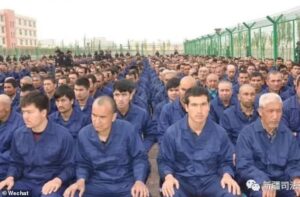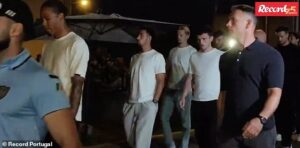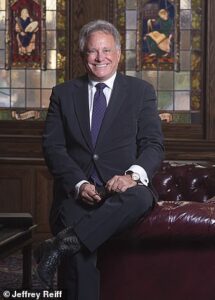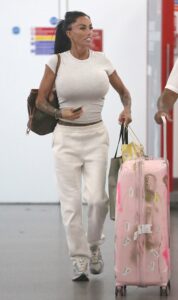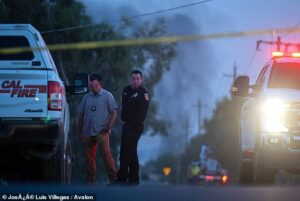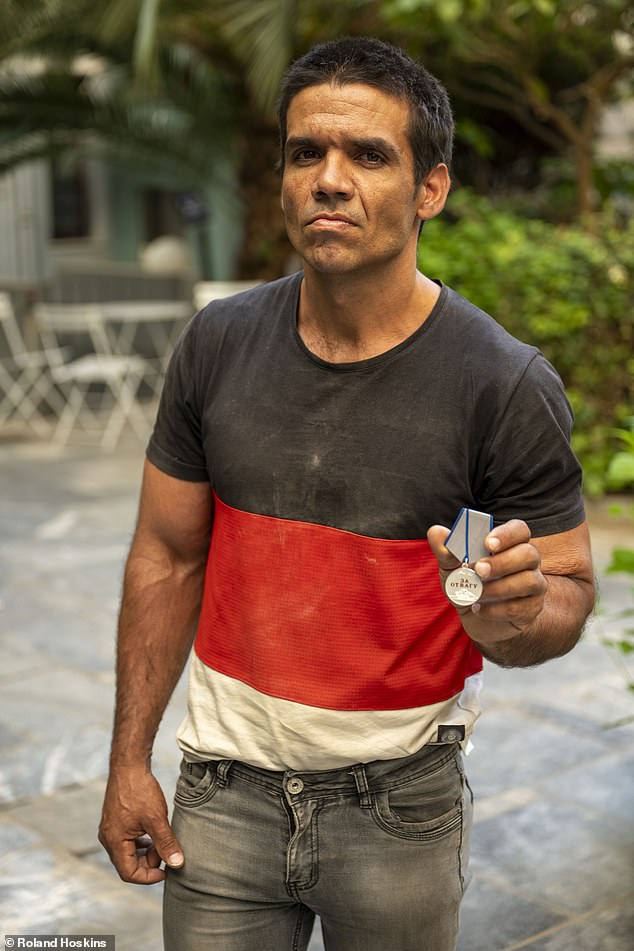
From the moment he stepped off the plane, Francisco Garcia knew he’d made the worst mistake of his life.
Hoping to escape poverty in his native Cuba, the 37-year-old was one of hundreds on the flight from Havana to Moscow.
All of them were lured by adverts on Facebook and other social media sites, promising high-paid construction work in Russia, repairing buildings damaged by Ukrainian bombardment.
But in reality the men were about to be press-ganged into the Russian army and sent to the frontline in Ukraine. At least half of them would be dead within a year.
Garcia survived, but with terrible physical and mental injuries that have left him homeless and in despair, afraid that he will never see his family again.
‘We weren’t allowed to show fear. The Russians told us we couldn’t feel pain or compassion and to be like robots on the battlefield,’ he says. ‘The commanders would hit us in the back of the head and the ribs with a gun to stop fear from existing.’
Garcia was a hospital porter in Cuba, earning about 40p a day for a gruelling 12-hour shift. Naively, he didn’t question what might lie behind the enticing online ad a friend showed him. It offered a ‘work permit, 204,000 roubles a month [about £1,900] and a Russian passport’.
Just three days later, he bid his parents a tearful farewell and boarded a crowded airliner, clutching a tourist visa. After 13 hours, an ominous welcome was waiting at Sheremetyevo International Airport. A Cuban man in military fatigues, backed by Russian soldiers, ordered the men onto a convoy of army trucks.

Francisco Garcia claims to have been one of hundreds on a flight from Havana to Moscow after answering an advertisement looking for builders to repair sites damaged by Ukrainian bombardment. Pictured: Francisco brandishing a medal awarded by the Russian army

Instead Francisco (pictured crouching on the far right with no hat) alleges he was forcibly enlisted into the Russian army against his will

Francisco was able to escape across Europe to Athens in Greece but says he has been left with scarring memories
‘We were shoved into the lorries,’ Garcia says, his voice shaking at the memory. ‘I was scared and confused by the military presence but it rapidly became clear we had to follow their orders and do what these people said. We were given no food or water. After a long journey, we came to an abandoned sports school which was being guarded by armed police.’
This was their billet for the next ten days, sleeping in closely stacked bunk beds. Then they were handed contracts in Russian and, amid much shouting and threats, forced to sign up for military service.
There were no explanations. But it was only too plain to Garcia what was happening. He was a conscript in Russia’s meat-grinder invasion of Ukraine, cannon fodder for the endless war.
‘There was nothing I could do now,’ he recalls. ‘It was made clear that I would either return to Cuba in a casket or as a hero, and the choice was mine. I thought, “My life is over”. I am now fighting in a war that has nothing to do with me.’
The next day, they were transported to a military facility, where they saw a pile of weapons unloaded from a truck. ‘I was handed an assault rifle – and this was the first time I ever held a gun.’
Garcia trained alongside people from Cuba as well as Asia and Africa over 30 days as the commanders barked orders in Russian. He adds: ‘I still remember the pain in my ears when I first heard a grenade go off. The sound was deafening and it still affects me today.
‘We would regularly do weapons training in a field where moving targets would appear and you’d have to shoot them down. And we were taught self-aid, in case something happened to us or another soldier.’
He was then shoved on to the frontlines of the war without any warning because ‘Russia was losing a lot of soldiers every day’.

Francisco holding a military firearm and a large knife after being forcibly enlisted into the Russian military
The involvement of troops from Communist North Korea fighting for Russia in its war against Ukraine has been well documented, not least by the Daily Mail. Indeed, the despotic regime of Kim Jong Un has announced it will send up to an additional 30,000 troops, to bolster the 11,000 drafted in to support Putin’s war since November.
Inadequately trained and led by Russian officers whose language they don’t understand, they have been easy prey for the Ukrainians’ guns and drones. At least 4,000 have been killed.
But until now the participation of troops from Cuba – another Communist country – has remained less well known. Yet more than 20,000 Cubans have been recruited by Russia since the ‘special military operation’ began in February 2022. Ukrainian intelligence data shows that there are close to 7,000 Cubans currently on the battlefield, again with little to no training.
Garcia is the first of these Cuban mercenaries to give a full account of what happens to them. He can only do so because, as we shall see, he is one of the very few to have escaped the meat-grinder. He managed to flee to Greece, where he told the Mail his terrifying story – and where he is now trapped, unable to return to his home country, which refuses to take him back, he says, because of his involvement in the war.
Garcia joined an artillery brigade, where he was made to carry heavy weaponry – including an assault rifle, a shoulder-fired rocket launcher and four grenades.
‘I quickly realised this was not a game any more and my mission was to survive. There were 90 Cubans like me at the start but more than half of them died in battle,’ he says.
‘It was the drones that were the biggest danger and we Cubans did not even know what they were at first. The kamikaze drones caused so much damage, much more than man-to-man combat. I saw things I would never wish on my worst enemy. I saw soldiers die around me and I saw soldiers commit suicide because they could not cope,’ he says, glaring down at the floor.
‘The Russians around us weren’t well and some of them killed themselves because of the toll this war took on them.

After being loaded into a truck and taken to the frontline, Francisco said he quickly realised ‘that I would either return to Cuba in a casket or as a hero, and the choice was mine’. Pictured: Francisco sitting on a military vehicle
‘They weren’t given holidays, they couldn’t see their families. We were making no ground and they thought this war would never end, so they ended it themselves.
‘The life of a soldier is very sad. It is getting drunk, eating and going to a place where there is wifi to speak with family and occasionally fight each other.
‘All that was getting me through this was hoping to one day see my family again.’
Garcia was badly wounded twice on the frontline and had to take care of himself after he was abandoned by Russian soldiers.
‘We came under attack during one patrol. It was a quiet evening and suddenly, there were bullets whizzing past everywhere. I scrambled to protect myself but I was hit. It felt like I was hit with a giant hammer but I didn’t feel much pain because of the adrenaline and trying to save my life.’ He points to a large scar on his right bicep: ‘I wasn’t provided with any protection and blood was pouring out of my arm.
‘I was in shock and quickly put on a tourniquet and injected a shot of morphine in my stomach to get through the pain and escape the Ukrainians.
‘But after I got to safety, it was as if my arm had fallen asleep and I couldn’t move it properly. I wish I got more hurt because I would no longer have been involved in a war over nothing.’
His second injury happened, he says, ‘when a bomb hit a building near me. I can still hear the piercing noise today. Some metal parts from the explosion hit me in my left arm and both my legs, and a toxic smell came out.

Francisco Garcia, a Cuban who was duped and enlisted into the Russian army, wearing his military fatigues on the frontlines
‘I instantly thought about my family. But I had to pick myself up and escape because the other Russian soldiers just ran away.
‘After I made it out again, I was taken to a doctor to be treated. Each time I was away from the battlefield for around a month before I was rushed back.’
He insists he never killed anyone and there were only a couple of occasions where he had to shoot back at Ukrainian soldiers – but only to stay alive.
‘I don’t know if I wounded anyone because I just shot in a panic, but that is always in the back of my mind,’ he claims.
After surviving a year in a Russian artillery brigade in Rostov, Donetsk and Soledar, Garcia was handed a medal and certificate in honour of his service, and was given two months off in October 2024.
He used this time to hatch his escape plan, finding a people smuggler who claimed he could get him to Greece safely for one million Russian roubles, equivalent to £9,400.
Although Garcia had been paid every month, he had not been permitted to send money back to his family in Cuba – so the money was sitting in a Russian bank account. He had just enough to cover the trafficker’s fee. Staying in the airports between flights, he was shuttled across six countries, from Belarus to Azerbaijan, then the United Arab Emirates and Egypt, before finally arriving in Athens.
He travelled on his Cuban passport having never applied for a Russian passport on the advice of a kindly Russian commander who warned him that, if he became a Russian citizen, he would be doomed to fight until the war ended.

Francisco wearing a face mask and holding a Russian-issue weapon – he says he only ever ‘shot in a panic’ but is haunted by the idea he may have wounded or even killed Ukrainian soldiers
Once in Athens, he was held in Amygdaleza detention centre for two months before being released. He is now sleeping in a tent in the Greek capital, where he spoke to the Daily Mail.
‘I am living a very difficult life here,’ he says. ‘I have been through a lot of hardship and no one is helping me. I am sleeping on the streets and struggling to survive. I wish I could just go back to my simple life before in Cuba but I can’t.
‘I am also afraid about what Russia will do to me for escaping. I am fearing for my life every day and looking over my shoulder. Putin said traitors will never be forgotten and that haunts me.’
But not everyone is prepared to take Garcia’s story at face value. Maryan Zablotskyy, a Ukrainian MP who analyses the number of foreign recruits fighting for Russia, believes Garcia is a security threat to the EU rather than the naive man who sought a job in Russia he purports to be.
‘This could be very dangerous to the continent,’ Zablotskyy said. ‘He agreed to kill Ukrainians for $2,500 a month.
‘All of those people, their existence in Cuba is miserable so they know what they are signing up for but don’t realise how heavy the war is.’
Last week, Cuba’s deputy foreign minister Carlos Fernandez de Cossio said Havana ‘denounced’ Cuban mercenaries fighting for Russia and claimed there were others fighting for Ukraine, too.
‘Our laws prohibit a citizen under our jurisdiction from participating in the wars of other countries. It is something that is punished by law in Cuba,’ he said.

Francisco says he is worried about reprisals for escaping: ‘I am fearing for my life every day and looking over my shoulder. Putin (pictured) said traitors will never be forgotten and that haunts me’
Despite being alerted to the security concerns raised by a Russian mercenary on the streets of Athens, the Greek authorities refused to comment.
The world got its first glimpse of Cubans fighting for Russia in August 2023 when two baby-faced teenagers begged for help to escape the meat-grinder.
Andorf Antonio Velazquez Garcia and Alex Rolando Vega Diaz, both 19, appeared in a video, dressed in Russian uniform, where they looked visibly distressed and scared for their lives.
‘It’s all been a scam,’ Andorf stated. ‘We need your help to get out of here.’
No one, including their families, has heard from them since.
Ukrainian intelligence services have analysed the passports of Cuban mercenaries who have joined the Russian army and found the youngest are 18-year-olds like Joender Raul Mena Alvarez-Builla and Alfredo Camaras Benavides, both born in 2005.
The oldest on record is 62-year-old Reinerio Robles, who died in battle, and the average age of the recruits is 36.
Frank Dario Jarrosay Manfuga, a 36-year-old musician, is the only known Cuban mercenary who has been captured by Ukraine.

Francisco joined an artillery brigade, where he was made to carry heavy weaponry – including an assault rifle, a shoulder-fired rocket launcher and four grenades
He said he went to Russia believing he was going to work in construction but like everyone else ended up on the frontline.
He is stuck in limbo because the Havana government also refuses to take him back.
Vitalii Matvienko runs a Ukrainian programme encouraging Russian soldiers to surrender.
The project has verified the identities of at least 8,425 foreign mercenaries from 106 countries fighting for Russia – although the total number is far higher.
‘This is not their war. Russia recruits them not because they are elite fighters, but because they are cheap, disposable manpower without any rights,’ he says.
‘Their deaths do not evoke any reaction in Russian society. That’s why Russian commanders don’t value foreign mercenaries – they send them to the most dangerous areas. When wounded or killed, no one rushes to evacuate them from the battlefield.’
Matvienko adds: ‘I want to address everyone who thinks they can solve their financial problems by fighting for Russia. This is a dangerous illusion. You will either be killed or return disabled.’
Francisco Garcia has the same message. But his words are much more deeply felt, the product of a nightmare experience.
‘I would tell any Cubans who see an advert promising a magical life in Russia to stay away,’ he says.
‘Life is precious and this is not worth it.’

